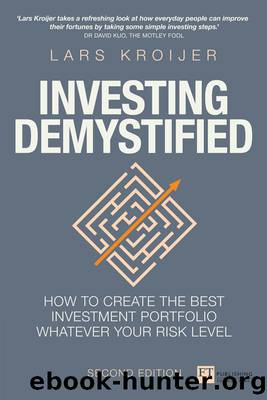Investing Demystified (Financial Times Series) by Lars Kroijer

Author:Lars Kroijer [Kroijer, Lars]
Language: eng
Format: epub
Publisher: Pearson Education Limited
Published: 2017-06-07T00:00:00+00:00
It really does depend on your circumstances
Like most things in investing, allocations are highly subject to individual circumstances and risk tolerance. Figure 10.4 shows how an investorâs allocations may change over his or her life, ignoring the complication of risky government and corporate bonds in the rational portfolio.
Figure 10.4 Stages of life: moving from equities as you age
Risk surveys
As discussed above, getting a handle on your risk tolerances is not only critical in investment management, but also a very individual thing. In my view, far too often investors rely on their gut feelings in deciding on the risk levels in their portfolios, or are guilty of what some call ârecencyâ where we overemphasise recent events in planning for the future.
Risk surveys are increasingly common in the financial industry and are sometimes mandatory for companies taking on new clients. You find them at most banks, insurance companies, asset management firms or your local regulator. As suggested, they are meant to give you an idea about your risk tolerances, often via stress tests, but in my view risk surveys often leave a lot to be desired.
Risk surveys that I have completed are too simplistic to give a really detailed view of your risk profile, often because they donât ask enough questions about your specific situation. Sometimes I find that the surveys are a prelude to someone trying to sell me a specific âtailor-madeâ product (read: expensive), instead of objectively trying to help me understand my risk tolerance. In addition, risk surveys often fail to properly incorporate all my other assets and liabilities, including seemingly odd ones like education, inheritance, future tuition for children, or other critical things like what stage of life Iâm at regarding career or retirement. The surveys therefore often fail to get a full picture of my financial life and in my view suffer in quality as a result.
With the caveats listed above, I would still encourage you to undergo a few risk surveys and to be on the lookout for new and improved surveys. Particularly if you are someone who is not used to thinking about your risk profile in the financial markets it probably makes sense to try a few surveys either through your financial institution, your domestic regulator or one of the many you can find on the internet. Who knows, they may tell you something you hadnât thought about, or perhaps you will have added comfort from confirming what your gut feeling tells you â see Figure 10.5.
The understanding and integrated tailoring of risk profiles will be a future growth area in financial services. While a risk survey is only as good as the information you put into it, if there was a seamless way to integrate all major aspects of our life to provide a fuller risk picture then those results could be very helpful to individual investors. One day I imagine that risk surveys will be informed by an incredibly detailed profile of you based on your portfolio, annuities, insurance, credit card bill,
Download
This site does not store any files on its server. We only index and link to content provided by other sites. Please contact the content providers to delete copyright contents if any and email us, we'll remove relevant links or contents immediately.
| Analysis & Strategy | Bonds |
| Commodities | Derivatives |
| Futures | Introduction |
| Mutual Funds | Online Trading |
| Options | Portfolio Management |
| Real Estate | Stocks |
Rich Dad Poor Dad by Robert T. Kiyosaki(6632)
Pioneering Portfolio Management by David F. Swensen(6300)
How To Win Friends and Influence People by Dale Carnegie(4513)
The Money Culture by Michael Lewis(4207)
The Dhandho Investor by Mohnish Pabrai(3765)
The Wisdom of Finance by Mihir Desai(3747)
Liar's Poker by Michael Lewis(3449)
Fooled by Randomness: The Hidden Role of Chance in Life and in the Markets by Nassim Nicholas Taleb(3124)
The ONE Thing by Gary Keller(3071)
Mastering Bitcoin: Programming the Open Blockchain by Andreas M. Antonopoulos(3045)
The Intelligent Investor by Benjamin Graham Jason Zweig(3041)
The Psychology of Money by Morgan Housel(3036)
Rich Dad Poor Dad: What The Rich Teach Their Kids About Money - That The Poor And Middle Class Do Not! by Robert T. Kiyosaki(2958)
Investing For Dummies by Eric Tyson(2954)
How to Day Trade for a Living: Tools, Tactics, Money Management, Discipline and Trading Psychology by Andrew Aziz(2949)
How to Win Friends and Influence People by Dale Carnegie(2915)
Market Wizards by Jack D. Schwager(2700)
How to Pay Zero Taxes, 2018 by Jeff A. Schnepper(2655)
Zero Hour by Harry S. Dent Jr. & Andrew Pancholi(2647)
